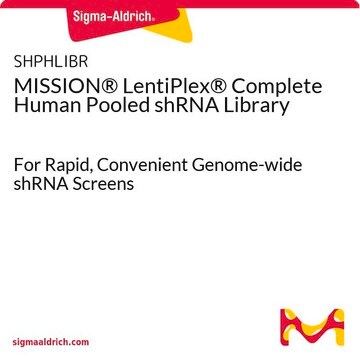ORFBFPH
MISSION® TRC3 ORF BFP Lentivirus High Titer Control
Iniciar sesiónpara Ver la Fijación de precios por contrato y de la organización
About This Item
Código UNSPSC:
41106609
NACRES:
NA.51
Productos recomendados
envase
vial of 200 μL
Nivel de calidad
concentración
5x108 VP/ml (via p24 assay)
aplicaciones
genome mapping
genomic analysis
Condiciones de envío
dry ice
temp. de almacenamiento
−70°C
Categorías relacionadas
Descripción general
The MISSION TRC3 ORF BFP Lentivirus High Titer Control Transduction Particles contain an ORF insert expressing BFP, and is useful as a positive (or negative control) in experiments using the MISSION TRC3 LentiORF Library Collection in arrayed or pooled format, including our latest Whole Genome LentiORF Pool.
The BFP ORF control transduction particles are produced from the sequence-verified lentiviral plasmid, pLX307-puro-BFP (ORFBFP). This positive control can be used for measuring transduction efficiency and optimizing ORF delivery in cell lines that do not survive any puromycin exposure. The BFP Control contains a gene encoding BFP driven by the EF1a promoter. This control provides fast visual confirmation of successful transduction. Ampicillin and puromycin antibiotic resistance genes provide selection in bacterial or mammalian cells respectively.
Unlike murine-based MMLV or MSCV retroviral systems, lentiviral-based particles permit efficient infection and integration of the construct into differentiated and non-dividing cells, such as neurons and dendritic cells, overcoming low transfection and integration difficulties when using these cell lines. Self-inactivating replication incompetent viral particles are produced in packaging cells (HEK293T) by co-transfection with compatible packaging plasmids.
In addition, the Control Transduction Particles are pseudotyped with an envelope G glycoprotein from Vesicular Stomatitis Virus (VSV-G), allowing transduction of a wide variety of mammalian cells. 200 μl of 5x108 TU/ml (via p24 titering assay) lentiviral particles are provided as frozen stock.
This high titer offering is recommended for customers: who need to utilize smaller volumes of virus, who have very difficult to transduce cell lines, or who need to transduce large numbers of cells.
When conducting experiments using MISSION TRC3 ORF clones, the proper controls should be a key element of your experimental design to allow for accurate interpretation of gene and protein expression results. The MISSION Control Transduction Particles are a critical positive control to monitor transduction efficiency.
To see application data, protocols, vector maps, and more visit the TRC3 Information Page
The BFP ORF control transduction particles are produced from the sequence-verified lentiviral plasmid, pLX307-puro-BFP (ORFBFP). This positive control can be used for measuring transduction efficiency and optimizing ORF delivery in cell lines that do not survive any puromycin exposure. The BFP Control contains a gene encoding BFP driven by the EF1a promoter. This control provides fast visual confirmation of successful transduction. Ampicillin and puromycin antibiotic resistance genes provide selection in bacterial or mammalian cells respectively.
Unlike murine-based MMLV or MSCV retroviral systems, lentiviral-based particles permit efficient infection and integration of the construct into differentiated and non-dividing cells, such as neurons and dendritic cells, overcoming low transfection and integration difficulties when using these cell lines. Self-inactivating replication incompetent viral particles are produced in packaging cells (HEK293T) by co-transfection with compatible packaging plasmids.
In addition, the Control Transduction Particles are pseudotyped with an envelope G glycoprotein from Vesicular Stomatitis Virus (VSV-G), allowing transduction of a wide variety of mammalian cells. 200 μl of 5x108 TU/ml (via p24 titering assay) lentiviral particles are provided as frozen stock.
This high titer offering is recommended for customers: who need to utilize smaller volumes of virus, who have very difficult to transduce cell lines, or who need to transduce large numbers of cells.
When conducting experiments using MISSION TRC3 ORF clones, the proper controls should be a key element of your experimental design to allow for accurate interpretation of gene and protein expression results. The MISSION Control Transduction Particles are a critical positive control to monitor transduction efficiency.
To see application data, protocols, vector maps, and more visit the TRC3 Information Page
Aplicación
Functional Genomics/Overexpression Screening/Target Validation
Nota de preparación
Puro Kill Curve and Determining CFU (Colony Formation Unit) per mL. Prior to performing a library-scale screening, two preliminary experiments must be conducted. Visit the Lentiviralpool Information Page or refer to the technical bulletin.
Información legal
Use of this product is subject to one or more license agreements. For details, please see the MISSION License Page
MISSION is a registered trademark of Merck KGaA, Darmstadt, Germany
Producto relacionado
Referencia del producto
Descripción
Precios
Código de clase de almacenamiento
12 - Non Combustible Liquids
Clase de riesgo para el agua (WGK)
WGK 3
Punto de inflamabilidad (°F)
Not applicable
Punto de inflamabilidad (°C)
Not applicable
Certificados de análisis (COA)
Busque Certificados de análisis (COA) introduciendo el número de lote del producto. Los números de lote se encuentran en la etiqueta del producto después de las palabras «Lot» o «Batch»
¿Ya tiene este producto?
Encuentre la documentación para los productos que ha comprado recientemente en la Biblioteca de documentos.
Nuestro equipo de científicos tiene experiencia en todas las áreas de investigación: Ciencias de la vida, Ciencia de los materiales, Síntesis química, Cromatografía, Analítica y muchas otras.
Póngase en contacto con el Servicio técnico







